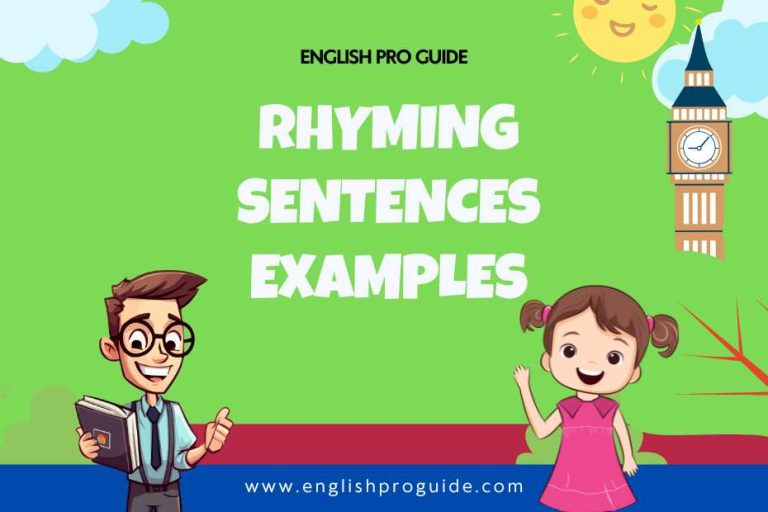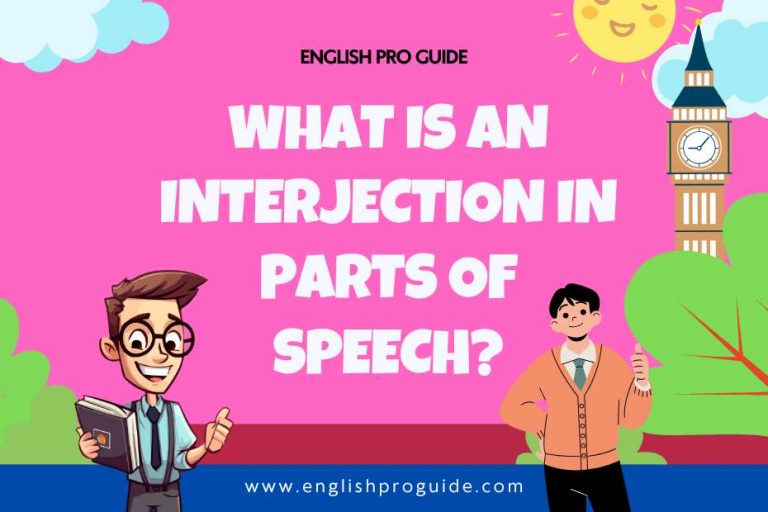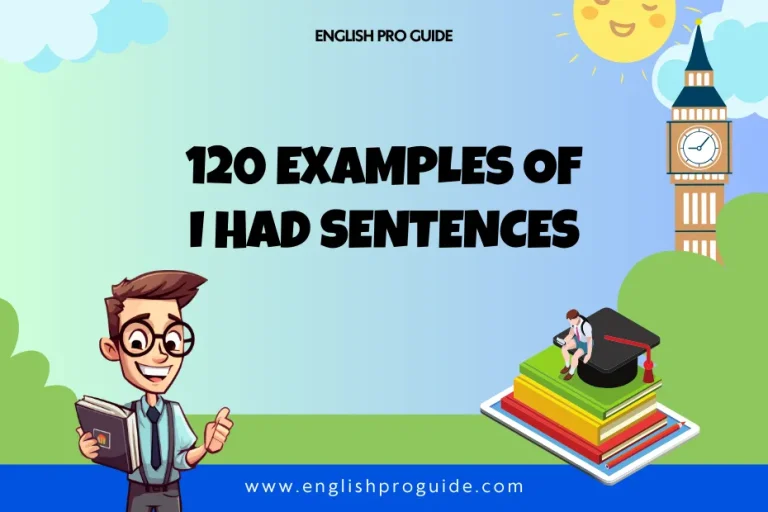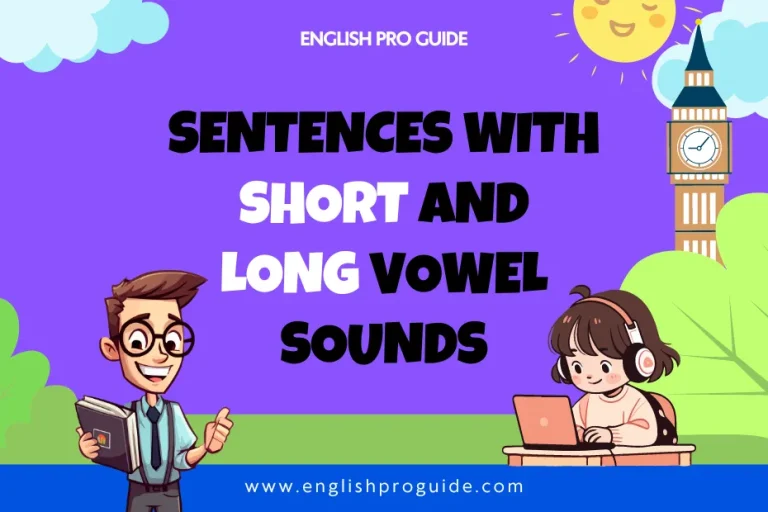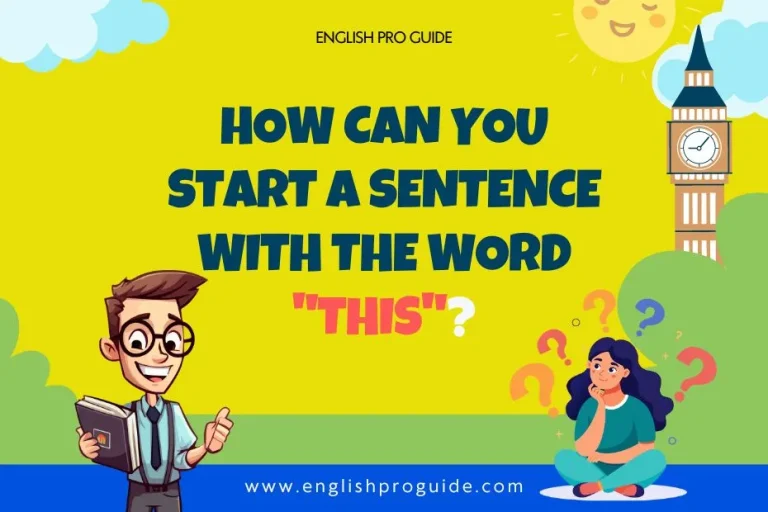List of 60+ Don’t Have To Sentence Examples
“Don’t have to” is a useful phrase in English that helps express something that isn’t necessary or required.
When you say “don’t have to,” it means there’s no obligation to do something, but it’s still possible to do it if you want. It’s an important distinction because it helps people understand what’s optional versus what’s required.
How to Use “Don’t Have To”
Here is the structure to make a sentence
- Subject + don’t have to + base verb
- Subject + doesn’t have to + base verb (for third person singular)
When to Use “Don’t Have To”
Use “don’t have to” when you want to express that something is optional, not required. This phrase indicates that while a certain action or choice is available, it is not necessary to perform it. For example:
- You don’t have to bring a gift to the party (it’s nice, but not mandatory).
- He doesn’t have to finish the report today (he can do it later if needed).
It’s typically used in everyday situations when you want to relieve someone from an obligation or emphasize flexibility in a task.
Common Mistakes with “Don’t Have To”
Confusing it with “must not”: Many learners mix up “don’t have to” with “must not,” but they mean different things. “Don’t have to” means something is optional, while “must not” means something is prohibited.
Forgetting subject-verb agreement: For third-person singular subjects like “he,” “she,” or “it,” you must use “doesn’t have to” instead of “don’t have to.” For example: “She doesn’t have to come” (not “She don’t have to come”).
Overusing it in formal contexts: While “don’t have to” is common in casual conversation, avoid using it too frequently in formal writing, as it can sound informal. Consider alternatives like “is not required to.”
Read More: Would have been sentences examples
“Don’t Have To” vs. “Must Not”
These two phrases often cause confusion, but they serve different purposes:
“Don’t have to”: Implies that something is optional. There’s no requirement to act, but doing so is still allowed.
Example: You don’t have to call him now (you can, but it’s not necessary).
“Must not”: Implies a prohibition. You are not allowed to do something.
Example: You must not call him now (it’s forbidden).
Understanding this difference is crucial, as using one in place of the other could lead to misunderstandings.
Don’t Have to Sentence Examples
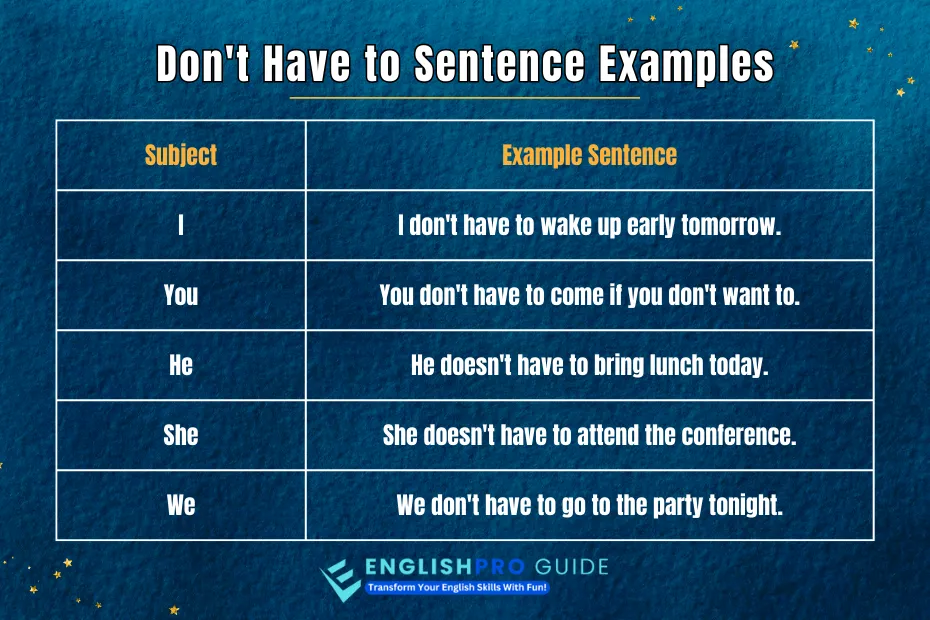
We know its bothering you to structure that all, Isn’t it? We made a list for your daily practice, Check them out from below table.
Read More: Adverbs Of Frequency Quiz Pdf? 100 Quizzes and Answer
List of 60+ Don’t Have to Sentence Examples
| Subject | Example Sentence |
|---|---|
| I | I don’t have to wake up early tomorrow. |
| You | You don’t have to come if you don’t want to. |
| He | He doesn’t have to bring lunch today. |
| She | She doesn’t have to attend the conference. |
| We | We don’t have to go to the party tonight. |
| They | They don’t have to worry about the test. |
| John | John doesn’t have to finish the project today. |
| The students | The students don’t have to submit their assignments by Monday. |
| My parents | My parents don’t have to leave so early. |
| Sarah | Sarah doesn’t have to travel this weekend. |
| The kids | The kids don’t have to go to school today. |
| The dog | The dog doesn’t have to wear a leash in the backyard. |
| We | We don’t have to clean the house this weekend. |
| I | I don’t have to attend the meeting if I’m not interested. |
| They | They don’t have to agree with everything you say. |
| You | You don’t have to pay for dinner tonight. |
| He | He doesn’t have to finish his homework now. |
| She | She doesn’t have to get up so early for work. |
| The workers | The workers don’t have to come in on Saturday. |
| The chef | The chef doesn’t have to prepare dessert for everyone. |
| We | We don’t have to rush; there’s plenty of time. |
| I | I don’t have to visit the doctor unless I feel worse. |
| The team | The team doesn’t have to practice today. |
| You | You don’t have to worry about that right now. |
| He | He doesn’t have to bring his tools today. |
| She | She doesn’t have to attend every single lecture. |
| We | We don’t have to stay late to finish the work. |
| They | They don’t have to agree to the plan. |
| The manager | The manager doesn’t have to approve the request immediately. |
| My friend | My friend doesn’t have to drive me home. |
| You | You don’t have to explain everything to me. |
| I | I don’t have to apologize for something I didn’t do. |
| We | We don’t have to take the bus if we don’t want to. |
| She | She doesn’t have to buy a new dress for the event. |
| He | He doesn’t have to bring anything to the potluck. |
| The children | The children don’t have to go to bed so early. |
| You | You don’t have to make a decision today. |
| I | I don’t have to pack my bags until tomorrow. |
| The couple | The couple doesn’t have to move into the new house right away. |
| They | They don’t have to take the test this week. |
| We | We don’t have to attend the seminar. |
| She | She doesn’t have to pay the bill right now. |
| He | He doesn’t have to apologize if he didn’t do anything wrong. |
| You | You don’t have to follow all the rules strictly. |
| I | I don’t have to work this weekend. |
| The neighbors | The neighbors don’t have to leave so soon. |
| They | They don’t have to travel during the holidays. |
| You | You don’t have to participate in the event. |
| He | He doesn’t have to finish his work today. |
| She | She doesn’t have to buy anything from that store. |
| We | We don’t have to hurry to catch the bus. |
| They | They don’t have to clean the room now. |
| I | I don’t have to call her if I don’t want to. |
| The cat | The cat doesn’t have to go to the vet today. |
| The athletes | The athletes don’t have to train every day. |
| You | You don’t have to answer all the questions. |
| He | He doesn’t have to meet her parents tonight. |
| She | She doesn’t have to finish the book by tomorrow. |
| We | We don’t have to stay for the entire movie. |
| They | They don’t have to play the game if they’re not ready. |
| The teacher | The teacher doesn’t have to grade all the papers today. |
| I | I don’t have to eat dessert if I don’t want to. |
| You | You don’t have to attend the wedding. |
| He | He doesn’t have to take the car to the mechanic today. |
| She | She doesn’t have to bake a cake for the party. |
| We | We don’t have to leave the house until later. |
| The students | The students don’t have to bring their textbooks tomorrow. |
Final Thoughts
Using “don’t have to” in everyday conversation can make your communication clearer. It’s a polite way of explaining that something is optional, without creating pressure.
This phrase can help you manage expectations and avoid misunderstandings in both casual and formal situations.


